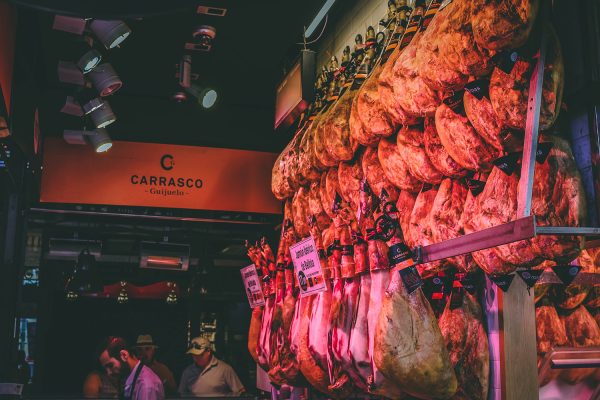
Meat eaters can be thin-skinned.
In the Netherlands, Wakker Dier, an animal-rights charity, discovered that the previous minister of agriculture, Carola Schouten, vetoed the inclusion of eating less meat in a “what you can do to fight climate change” campaign for fear of upsetting carnivores.
That such fears are not unfounded is borne out by the experiences of politicians in France and Spain.
Symbol of virility
Sandrine Rousseau, a parliamentarian for France’s opposition Green party, triggered men when she argued they need to change their attitude, “so that eating a barbecued entrecôte is no longer a symbol of virility.”
French men eat almost 60 percent more meat than women.
The Green party has just 23 out of 577 seats in the National Assembly. Rousseau lost her presidential bid to the center-left Yannick Jadot a year ago and has since moved even farther from the mainstream by suggesting that men who don’t share in households chores should be criminalized.
So why care? Because meat is a useful wedge issue.
For the right. Eric Ciotti, a Republican rightwinger and failed presidential candidate, called Rousseau’s proposal “madness”. Julien Odoul, a member of Marine Le Pen’s far-right National Rally, insisted that male overconsumption of meat is not about virilism; “it’s nature.”
And for the old left. Fabien Roussel, the leader of the Communist Party, insists “good wine, good meat, good cheese” are the definition of “French gastronomy,” adding:
Meat consumption is a function of what you have in your wallet, not in your panties or your underpants.
President Emmanuel Macron’s centrists didn’t take Rousseau’s bait. But when the Green party mayor of Lyon, Grégory Doucet, took meat off the menu of primary school lunches for one day per week, both the minister of the interior, Gérald Darmanin, and the minister of agriculture, Julien Denormandie, stepped in to demand an end to such an “elitist”, “moralist” and “scandalous” policy. The Republicans called Doucet a “totalitarian”. Hitler was a vegetarian too.
“A steak is hard to beat”
Spain’s far-left minister for consumer affairs, Alberto Garzón, provoked a similar uproar when he described factory farming as unsustainable:
They find a village in a depopulated bit of Spain and put in 4,000 or 5,000 or 10,000 head of cattle. They pollute the soil, they pollute the water and then they export this poor-quality meat from these ill-treated animals.
The opposition People’s Party called Garzón’s remarks “unacceptable”. Group leader Cuca Gamarra insisted “severe damage has been inflicted to the Spanish economy.” (There hasn’t.) Alfonso Fernández Mañueco, the president of Castile and León, which has a large livestock industry, demanded Garzón’s resignation.
Unlike Rousseau’s Greens, Garzón’s formerly communist United Left is in government. But even Prime Minister Pedro Sánchez, a social democrat, appeared to scoff at Garzón’s suggestion to eat less meat, saying, “A medium-rare steak is hard to beat.”
Europeans eat too much meat
Greens and communists aren’t going to convince many Europeans to give up meat. That doesn’t mean they’re wrong.
Spaniards eat about as much meat as Americans: 100 kilograms per year. On average, Europeans eat twice as much meat as the rest of the world; the French around 80 kilos, the Dutch 76. The Netherlands’ food authority thinks 26 kilos of meat per year is enough. The World Cancer Research Fund recommends no more than three portions of red meat per week.
Meat is a valuable source of iron, protein and other nutrients, like vitamin B12 and zinc. But most can be found in fish and vegetables as well. B12 is typically added to plant-based dairy and meat substitutes. Eating too much — especially red — meat can cause bowel cancer and raise cholesterol levels, which ups the risk of heart disease and stroke.
Skip a steak, save the planet
Sánchez may find it hard to say no to steak, but occasionally skipping meat is one of the easiest things Europeans can do for the sake of not just climate change, but their local environment and the welfare of farm animals as well.
Livestock farming accounts for 15 percent of greenhouse gas emissions. Nearly half those emissions are generated in the production of animal feed and close to half emanate from manure.
Manure is also a source of ammonia pollution, which can be toxic to local plant- and wildlife — and people. We’ve learned that in the Netherlands. We have the highest livestock density in the world and the highest emissions of ammonia per hectare in the EU, after Malta. 70 percent of Dutch insects have disappeared in the last thirty years. Estimates of the decline in bird species (who eat insects) vary, but there is no doubt they have also seen steep reductions since the rise of factory farming. Ammonia seeps into the groundwater, which people drink and other farmers use to irrigate their crops. In the province of Brabant, which has the largest animal farms in the country, life expectancy is a full year lower than in the rest of the Netherlands.
The amount of water needed to produce a kilogram of meat depends on where animals are reared and at what age they are slaughtered. The global average is 15,415 liters for beef, almost 6,000 for pork and 4,300 for chicken. Producing one kilogram of cereals, by comparison, takes 1,640 liters of water; vegetables, 320 liters. The production of livestock feed (mostly cereals and soy) accounts for 41 percent of agricultural water use.
Animals in factory farms are caged, routinely mutilated (“debeaked”, “tail-docked” and artificially inseminated), often kept permanently indoors and consistently overfed to produce as much meat as possible in as short a time. Animals are unable to behave naturally, tend to develop physical ailments from lack of movement or standing or lying in their own feces, and show signs of depression and stress. Factory farms are incubators of disease, some of which, like Q fever and swine flu, have spread to humans.
